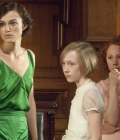The New York Times – 21 octobre 2015
Keira Knightley, Making Her Broadway Debut, Is Not Afraid of the Dark
By JESSE McKINLEY
On a recent afternoon under a brooding artificial sky, Keira Knightley — she of the pirate and period movies — was once again sitting in a rocking boat on a churning body of water. Men were fighting over her, as usual, and one of them wasn’t going to make it to shore. But Ms. Knightley was yawning anyway.
The dinghy in question was safe, mind you, surrounded by the walls of Studio 54, where Ms. Knightley is starring in the title role of the Roundabout Theater Company production of « Thérèse Raquin, » Helen Edmundson’s stage adaptation of Emile Zola’s classic 19th-century tale of love, guilt and the critical importance of swimming lessons.
While the sight of a movie star wedged in a rowboat — it bobs in a shallow pool devised by the set designer Beowulf Borritt – was odd, perhaps the more telling detail was that yawn, which during this particular technical rehearsal was likely born more from exhaustion than ennui.
Ms. Knightley, after all, is preparing to make her Broadway debut on Thursday, Oct. 29, just five months after another first: the birth of a little girl named Edie, whose toys, blankets and nappies are a common sight in her dressing room at the theater.
She’s discovered that motherhood, like theater itself, can be dirty work.
« We’re doing note sessions, and I’m literally cleaning the snot off my daughter’s face, » Ms. Knightley said, sitting in a dressing room bedecked with proud parent Polaroids and more than a few Wet Wipes. « And my husband’s trying to change her diaper as she rolls along the floor. »
Ms. Knightley seems equally enthusiastic and intimidated about both debuts, speaking in similar terms about the role of Thérèse — « It’s as dark as they get, you know, sort of like jumping off a cliff into hell » — and the intensity of a new mother’s love.
« You give birth to something and you go, automatically, ‘I would die for it,’ and you don’t feel like that for any other thing, » Ms. Knightley said, adding: « This little thing that’s screaming at me, and there’s absolutely no question. And that’s dark, and it’s deep, and it’s very, very, very strange. »
The play — one of only two written by a woman scheduled for Broadway this season — rests on the actress’s drawing power and Ms. Edmundson’s reputation as an elite interpreter of highbrow literary fare. But it’s no sure thing; a 2001 adaptation, « Thou Shalt Not, » failed to connect with audiences despite music and lyrics by Harry Connick Jr. (The Roundabout production has been drawing solid but not blockbuster audiences during previews.)
For an actress known for her ability to sparkle and charm in several accents, « Thérèse Raquin » is something of a change of pace: As imagined by Ms. Edmundson, Ms. Knightley’s tragically repressed Thérèse is onstage for nearly the show’s entire two and a half hours. And for the first 30 minutes or so, she barely speaks, only periodically having a one-sided conversation with… a river.
But Thérèse’s life quickly gets more passionate (thanks to Laurent, a handsome friend of her husband’s, played by Matt Ryan) and poisonous (Laurent, again). Depending on your viewpoint, the character is either a victim of love or just marginally insane, complete with the violent mood swings that either condition implies.
It’s a role that in some ways mirrors Ms. Knightley’s cinematic take on « Anna Karenina, » another woman whose affair with another man goes off the rails.
« I get very interested with people who are caged in some way, » Ms. Knightley said, « and I think it’s quite true that very often people who try to break out of their perceived cage do get punished for it, whatever that cage is. »
Ms. Knightley makes this remark as she does many: casually and quickly, with the incipient smile — and sense of self-effacement — that marks her conversation. Sitting in a comfortable black sweater, dark dungarees and Day-Glo sneakers — « I’m a complete scruff, » she said — she conveys unguarded ease and unsettled opinions. Asked if she’s an extrovert, for instance, she touched on some other issues before coming to this conclusion.
« I don’t think I am, » she said. « And yet I must be, because that’s what I do for a living. »
Her current role might surprise casual fans of Ms. Knightley — and even her detractors — who still think of her as either the energetic ingénue seen in « Bend It Like Beckham, » her 2002 breakthrough; the heart-strung heroine of films like « Atonement » or the « The Imitation Game »; or the swashbuckling Elizabeth Swann from three « Pirates of the Caribbean » movies, which helped make her internationally famous, a target of Internet scorn and the object of the periodic stalker.
But now, at 30, Ms. Knightley has seemingly put her buccaneering days behind her — she did not appear in the 2011 installment of the franchise, nor is she in the next one, due in 2017. And in recent years, she quietly managed to assemble an eclectic resume of film performances that have, if not silenced critics, certainly challenged them: “Never Let Me Go,” from the Kazuo Ishiguro novel about creepy clones; « A Dangerous Method, » the Freud versus Jung drama; « Begin Again, » an oddball romantic outing with Mark Ruffalo in which she sang and played guitar; and last year’s « Laggies, » a finally-coming-of-age comedy in which she played a woman in the midst of a « quarter-life crisis. »
That period also corresponds with two forays by Ms. Knightley into the theater scene in London, including a mildly received revival of Moliere’s « The Misanthrope » in late 2009, and a more successful turn in 2011 in Lillian Hellman’s « The Children’s Hour. » Writing in The New York Times, Ben Brantley praised Ms. Knightley and her co-star Elisabeth Moss for « credible fierceness. »
« You never doubt that both these women are raw with anguish, though for different reasons and in different ways, » he wrote.
Even before that, however, the character of Thérèse Raquin was apparently waiting for her: She’d been offered the role two other times in her 20s, which she admitted to turning down because it was something « I don’t know how to do. »
Moreover, she said, she was a touch concerned about why people thought she’d make a good Thérèse. « Why do people keep seeing me as this vaguely psychotic repressed strange woman? » she said.
But last year, when her agent sent her Ms. Edmundson’s adaptation, she figured it was a sign. « When it came back to me the third time I thought, ‘Well this is weird,' » she recalled. « And I am still frightened of it, and I don’t know how to do it and there are so many problems with putting it on. But I was sort of up for the challenge. »
Part of that, she said, was boredom from reading « a hell of lot of scripts with characters that were the supportive girlfriend/wife. »
« I’m the supportive wife at home, » she said. « I just didn’t particularly fancy playing that. » (Ms. Knightley’s husband is the English musician James Righton.)
She agreed to do the role, however, before she knew she was pregnant, and her initial instinct upon finding out was to withdraw from the production. But a coterie of female friends and family argued otherwise.
« My mother and various other very strong feminists around me went, ‘How could you say that? Of course you don’t back out, of course you stick to it, of course you do it all,' » Ms. Knightley said. « And I went, ‘Oh yeah, yeah, all right O.K., yeah, O.K.’ And then I got even closer to it and thought: ‘Oh this really could be quite tricky with no sleep.’ And it is. »
Indeed, as opening night approaches, she’s been fighting a mean cold — perhaps from all those dips in the onstage river — and sprained her wrist during an early preview while lunging at Gabriel Ebert, who plays her blithely cruel husband Camille. Then, too, there was the performance briefly interrupted by a male admirer who threw flowers — and a marriage proposal — from the mezzanine. (She did not break character — or accept.)
Ms. Knightley’s co-stars have praised her ability to fend off distractions such as these, as well the animosity that the actress’s success seems to engender in some people, particularly chin-obsessed women.
Judith Light, the two-time Tony winner who plays Madame Raquin, the controlling French matriarch in the play, said Ms. Knightley’s down-to-earth demeanor, intelligence and sense of humor had impressed her.
« In a situation like that it can go one or two ways, and we all know the stories about the other ways it can go,” said Ms. Light. “And it has been just a really glorious experience. »
Ms. Knightley said she’s at home with criticism. « I’m not saying bad reviews or things like that don’t hurt, because of course they do, and they’re designed to and they should hurt,” she said. “But also I can’t take them too seriously. You’re basically saying you don’t like it when I pretend to be someone else? O.K., cool. »
That extends to the often-repeated critique that Ms. Knightley is merely well lit, not well cast, in period dramas, something she’s unapologetic about.
« I do a lot of period pieces because that’s my taste, because I want to work in Europe, because that’s my home and generally speaking that’s what’s made in England, » she said. « I love history, you know, but actually because they’ve been the most interesting characters for me that I’ve been offered. »
And modern characters are often not as deep, she said. “Now that could just be me: I think that there’s plenty of actresses that play very interesting roles in modern day pieces,” she said. « But that hasn’t been what’s come my way. »
Evan Cabnet, the production’s director, said Ms. Knightley had agreed to do the role after a three-hour Skype conversation. He said that while he found her graceful, he said he also liked « this real rough tomboy streak in her that she doesn’t always get to indulge. »
Indeed, while some of her most famous characters may have been more likely to say « What, what, » or « Avast!, » Ms. Knightley wields a considerably more modern vocabulary, and all the curse words therein. Part of that may be caused by « a wash of complete sleeplessness, » with rehearsals and performances wedged between early-morning/late-night feedings.
Mr. Righton brings Edie to the theater often, something Mr. Cabnet said had a soothing effect on the cast. « There’s something so emotionally traumatic about the play and story, there’s something really beautiful in the middle of that to have a little baby around, » he said.
For her part, Ms. Knightley says she may well want « a complete piece of frivolity » after tackling Thérèse. But regardless of her reception on Broadway, it sounds as though her plunge into theater — and dark roles — may continue.
« I think actually that’s why I enjoy theater: It doesn’t exist, » she said. « It’s not like film, which is stuck there forever. » She continued: « The show that you see tonight, whether it works or whether it doesn’t work, nobody will ever see that again. Tomorrow will be completely different. And I find that incredibly romantic. »
Source : The New York Times

 L’Étrangleur de Boston
L’Étrangleur de Boston Black Doves
Black Doves The Other Typist (mini-série)
The Other Typist (mini-série)

















 CHANEL - Coco Mademoiselle
CHANEL - Coco Mademoiselle Miss Révolution
Miss Révolution Joyeuse fin du monde
Joyeuse fin du monde Charlotte
Charlotte